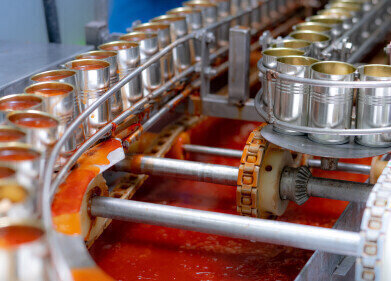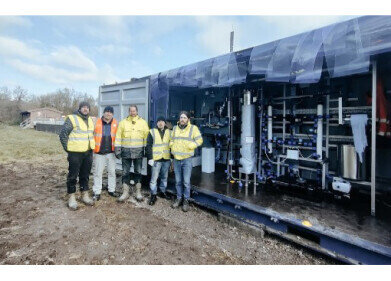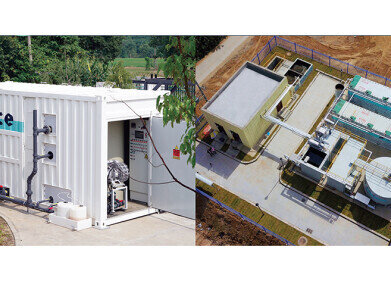Wastewater treatment
HYBACS wastewater treatment plant installed for aqualia in Spain nutrient removal and water reuse capabilities attract government investment
Oct 31 2009
Bluewater Bio International (UK), the provider of a high-performance yet highly cost-effective proprietary wastewater treatment process called HYBACS, announces that it has successfully installed its first wastewater treatment pilot plant in Spain. Bluewater Bio is developing the project with Aqualia Gestiόn Integral del Agua S.A. (“aqualia”), a leading water company in Spain, and a subsidiary of multi-national utility company Grupo FCC.
The project is supported by grant funding of nearly €90,000 to Aqualia Infraestructuras, an engineering subsidiary, from the Spanish Environment Ministry (Ministerio de Medio Ambiente, Medio Rural y Marino; MARM). The plant installation is part of Bluewater Bio’s exclusive agreement signed last year with aqualia to promote the HYBACS technology.
The pilot plant, now commissioning at a municipal site in Ávila, approximately 100 km north-west of Madrid, is expected to serve as a reference for the subsequent implementation of this system in other aqualia facilities. The HYBACS (Hybrid Bacillus Activated Sludge) technology uses the naturally occurring bacteria bacillus to remove nitrogen, phosphorus and organic matter from a wide variety of wastewater streams to produce a very high-quality, odourless water resource that can be reused in many applications such as agriculture and industry.
Daniel Ishag, CEO of Bluewater Bio, comments: “The Spanish wastewater treatment market has immense potential for expansion and represents a key market for Bluewater Bio. Aqualia is one of the world’s largest wastewater companies and we are delighted to have achieved this latest milestone for HYBACS as aqualia’s first unit is installed in the Ávila plant. We are looking forward to working with aqualia to roll out the technology throughout Spain, a country with a severe requirement to conserve and reuse water. Further afield, aqualia is working with us on consortium bids in the Middle East and beyond, leveraging its position within global infrastructure giant Grupo FCC which manages water and wastewater related projects in over 850 municipalities on five continents.”
Fernando Moreno, Director General of aqualia, said: “We are pleased that the first HYBACS pilot plant in Spain has now been installed at Ávila and that commissioning is progressing well. Aqualia operates wastewater treatment plants across the globe and, therefore, the ability of Bluewater Bio’s HYBACS process to significantly reduce both our capital and operational expenditure is extremely attractive to us. In addition, the technology can potentially be retro-fitted into many of our current plants, enabling aqualia to comply more cost-effectively with the increased nutrient removal requirements in Europe. We see tremendous potential for the use of HYBACS both in Spain and further afield, and are excited to work with Bluewater Bio to bring this leading technology to our plants.”
Compared with competing processes such as conventional nutrient removal activated sludge, HYBACS produces treated effluents with average BOD (biological oxygen demand) values typically less than 10 mg/l from domestic sewage and removes at least 98% of the BOD from concentrated industrial wastewaters. It also consumes up to 50% less energy, whilst offering CAPEX reductions of up to 30%, OPEX reductions of up to 45%, and a footprint that is up to 40% smaller. HYBACS is well-suited to upgrading existing plants, leveraging more than 80% of activated sludge infrastructure.
Effective nutrient removal from wastewaters prevents the overgrowth of algae in seas, estuaries, lakes and slow-flowing rivers, thereby avoiding the consequent eutrophication (or ‘smothering’) of aquatic life. Spanish municipalities are required by law to remove pollutants and organic matter from wastewaters, but legal action from the European Commission alleges that treatment practices in more than 400 cities and towns across the country are currently below the EU standard for nutrient removal. Under a current EU directive treatment plants must now be equipped with proper removal technologies that meet the most stringent quality and nutrient standards in sensitive zones at risk of eutrophication.
Events
Carrefour des Gestions Locales de L'eau
Jan 22 2025 Rennes, France
Jan 29 2025 Tokyo, Japan
Feb 05 2025 Nantes, France
Feb 16 2025 Kampala, Uganda
Feb 26 2025 Chennai, India












